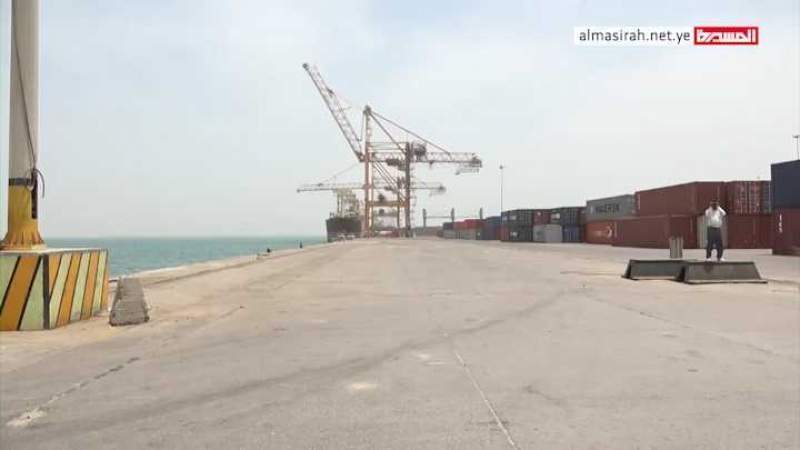Revenues of Aden Port Cover 80% of State Employees' Salaries

News - Yemen: US-Saudi aggression continues to impose a blockade on various commercial cargo ships and prevent them from sailing towards the port of Hodeidah, the Undersecretary of Ministry of Finance Ahmed Hajar has confirmed.
"The blockade of the countries of aggression and preventing commercial ships from reaching the ports of Hodeidah caused a significant decline in the navigational movement, which is reflected in the customs revenues of imported goods," he said.
He explained that the basic commodities represented in wheat, flour, rice and sugar are exempted from tax duties, and the Hodeidah port does not get any revenues from it.
He stated that the data of the General Organization for Red Sea Ports for 2021 showed that the port of Hodeidah received 203 ships, including 23 fuel tankers, while the data of the Gulf of Aden Ports Corporation for 2021 showed that the port received 513 commercial ships, including 120 fuel ships.
He indicated that the tax and customs revenues for the imports of the port of Aden, which is under the control of the occupation, during 2021 only, are estimated at 750 billion, explaining that these revenues cover 80% of the salaries of state employees.
For his part, the spokesman of the Yemen Petroleum Company Issam Al-Mutawakel explained that the revenues of fuel imports arriving at the port of Hodeidah are supplied to the account designated for salaries, the branch of the Central Bank of Hodeidah, according to Sweden agreement.
He stated that the revenues of fuel imports last year did not exceed 23 billion riyals, and this is a small amount that does not cover one month's salaries.
A UN-brokered truce in Yemen first came into effect on 2 April, and for an initial two months. It was renewed for another two months in June.
The deal stipulated halting offensive military operations, including cross-border attacks, and allowing fuel-laden ships to enter Yemen's lifeline Hodeidah port and commercial flights in and out of the airport in the capital Sana'a "to predetermined destinations in the region."
However, in light of UN silence, the Saudi-led aggression was still obstructing flights to the Sana'a International Airport in Yemen’s capital and detaining fuel ships that were headed to the country. The fires of the aggression side did not subside along the fronts, on the borders and inside, including shelling, reconnaissance, development and crawl.
When the period specified for the military and humanitarian truce was nearing its end, the US-Saudi aggression seemed to be in a hurry to adopt the option of extending it for the third time to freeze the battle in Yemen and its economic repercussions away from global energy markets.
The forces of aggression are pushing for an extension, not out of concern for peace, but rather out of fear that the escalation will add more complications to the international scene in addition to the crisis imposed by the Russian-Ukrainian war.
A truce, the positive effects of which have not been felt by the citizens over the past months, despite its broad headlines. Commercial flights to Cairo are still stumbling until today, and the navy of aggression continues to pursue fuel ships without respect for agreements or any regard for international laws and norms.
Double standards regarding the violations of the forces of aggression and its provocative practices is a double UN policy that has brought the crisis in Yemen to its current level of misery and deprivation that has affected everyone far from justice and the realization of the rights of the Yemeni people.
The truce has been renewed for an additional two months through 2 October, UN Special Envoy for Yemen, Hans Grundberg, announced on Tuesday.
The extension includes a commitment by the Saudi-led aggression and the Salvation Government to intensify negotiations to reach an expanded agreement as soon as possible.
The UN representative to Yemen Hans Grundberg confirmed that the extension of the truce in Yemen for two additional months "includes a commitment to provide fuel and its regular flow through the port of Hodeidah."
#Yemen #US-Saudi Aggression #Oil and Gas Revenues About 2 years-
06:57
Almasirah Correspondent in Sana’a: A U.S.-British aggression targeted 21st September Park in Ma’in District with an airstrike.
05:58
The General Conference of Arab Parties: Yemeni people will respond to the Zionist enemy's aggressions with strength and determination.
05:58
The General Conference of Arab Parties salute the stances, efforts, and sacrifices made by the Yemeni people, army, and leadership in supporting and standing by the Palestinian people.
05:57
The General Conference of Arab Parties reaffirm solidarity with the resilient Yemeni people, Ansarullah, and with the peoples of Lebanon and Syria.
05:57
The General Conference of Arab Parties: The violation of Yemen's sovereignty and territorial integrity, along with breaches in Lebanon and airstrikes on Syria, constitute a blatant infringement.





